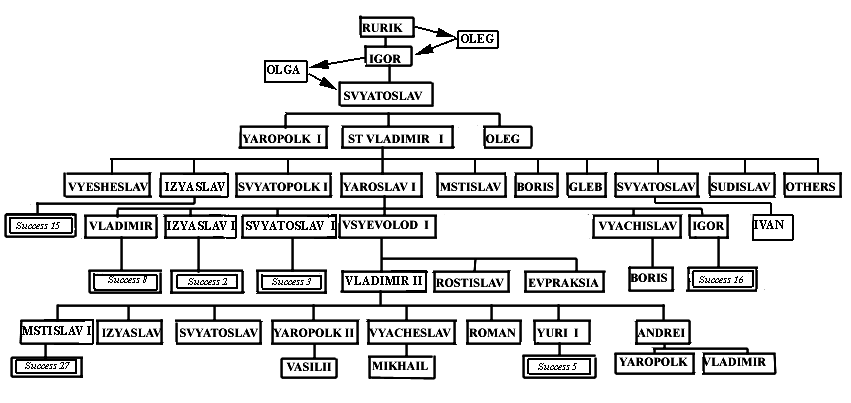|
The chart below depicts the first seven
generations of rulers of Rus descended from the semi-legendary Rurik. (Or six
generations from the historical Igor. Some historians have pointed out the
questionable matter of the time spread between the appearance of Rurik and the
known dates of Igor and calculated that there should be possibly two
generations between them). Skipping that issue, we have the period from about
860 AD to the death of Yuri I Vladimirovich in 1157. The history of fratricidal
conflict in this family began early, when Vladimir I brought a Varangian
(Viking) army south from Novgorod to unseat Yaropolk I from the throne at Kyiv.
It is evident that, since Yaropolk I and Oleg Svyatoslavich died without heirs
all subsequent princes in Rus were descendents of Vladimir I Svyatoslavich. He
sent his eldest son, Izyaslav, with the latter's mother, Ingegerd, to live in
Polotsk when he married the Byzantine princess, Anna. Thus the line of princes
who governed Polotsk is the only family not descended from Yaroslav I
Vladimirovich (the wise). This line is shown in the diagram from Izyaslav
Vladimirovich. Amongst Izyaslav's half brothers, Svyatopolk I seized the throne
on the death of their father, Vladimir I, and swiftly had his half brothers,
Boris, Gleb and Svyatoslav, murdered. Mstislav escaped this by being the ruler
in far southern Tmutorokan and Yaroslav escaped by being in far northern
Novgorod. Yaroslav then followed his father's example and brought a
Varangian-Novgorodian army south and routed Svyatoslav I and his Polish and
Pecheneg allies. After Yaroslav I was on the throne at Kyiv, Mstislav brought
an army north to dispute him. Mstislav won the battle, but there was a
subsequent compromise agreement by which Mistslav governed the left bank Rus
from Chernigiv and Yaroslav governed the right bank Rus from Kyiv. (But
Yaroslav prudently remained for the most part at Novgorod. The remaining
half-brother, Sudislav, was imprisoned. When Mstislav Vladimirovich died
without heirs (having been predeceased by his only son), all Rus (except
nominally Polotsk) was reunited under Yaroslav's control. In the next
generation, however, division commenced. Vladimir, Izyaslav I, Svyatoslav II,
and Igor Yaroslavich all founded princely houses that continued to rule
individual sections of Rus lands with more or less autonomy depending on
circumstances and the relative proliferation of their descendents. Their family
trees are shown in the diagrams below their names. Here is the chart showing
the relationship between the various geneology diagrams. The main line of Rus princes continued
through Yaroslav I Vladimirovich's grandson, Vladimir II Vsyevolodovich
Monomach. Two more major divisions then occured when two sons of Vladimir II,
Mstislav I and Yuri I, established separate princely houses in Galicia and
Rostov-Suzdal respectively. These may be followed in the diagrams under their
names. But in subsequent generations these and the line of Chernigiv princes
begun by Svyatoslav II all divided into still more separate lines. All these
are shown in subsequent diagrams linked to their parents.
To read short descriptions of the individual princes
please place your cursor over a name and see if a link to the individual is
provided. All the individual princes are linked also both to their fathers and
their sons. Thus one may follow the entire Rurikid family tree either by
moving from father to son through the individual biographies or by following
the chain of geneological diagrams. There is also a separate
chart showing only those princes who managed to
claim the throne at Kyiv, no matter how briefly. There is a separate
geneological chart for the Romanov family. There is also a file that provides a
direct listing of all the rulers from Rurik to Nicholas II in sequence
irrespective of their family ties at rusruler. The
individual descriptions provide a convenient place in which to add more
information on the ruler or reign as it is obtained. Already some are much more
extensive than others. An alphabetical index to all the princes is being
developed. And there is a chronology of events from pre-historical times to
about 1800. The geneological information is taken from V. M. Kogan's detailed
identifications in Istoriya doma Rurikovichei, St Petersburg, 1993 and
N. de Baumgarten's works Genealogies des branches regnantes de Rurikides du
XIII au XVI siecle, Orientalia Christiana vol XXXV-1 number 94 June 1943,
Pontifical Institutum Orientalium Studiorum, Roma, and Genealogies et
mariages occidentaux des Rurikides russes, Orientalia Christiana vol IX -
35 Pontifical Institutum Orientalium Studiorum, Roma. and N. M. Karamzin,
Istoriya Gosudarstva Rossiiskogo, Kniga Chetvertaya, Kluch, Rodoslavoniya
Tablitsi knyazei Rossiiskikh', St Petersburg, 1844, reprinted Moscow 1988.
|
|



